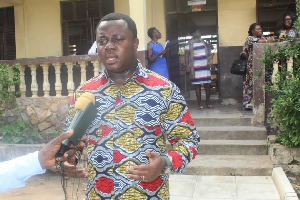 Rev, John Ntim Fordjour is Deputy Minister of Education
Rev, John Ntim Fordjour is Deputy Minister of Education
Reverend John Ntim Fordjour, Deputy Minister for Education, has expressed satisfaction with the steady improvements in learning outcomes of targeted schools following the rollout of the Ghana Accountability for Learning Outcomes Project (GALOP) in basic schools.
The deputy minister said that since the introduction of the project in 2020, there has been improvement in learning outcomes due to the excellent skills exhibited by the teachers to keep the pupils motivated in learning.
Rev Fordjour said this when he led a delegation from the Ministry of Education to monitor the implementation of GALOP in the Greater Accra and Eastern regions.
The team visited Ahwerase Presby Primary and Kindergarten School and Konkonuru Basic School in the Akwapim South district in the Eastern Region.
In the Greater Accra Region, the team visited ICODEHS Islamic Basic School and St. Francis of Assisi Basic School in the Adentan Municipality.
Under the GALOP initiative, teachers have been trained in differentiated learning and targeted instruction, including teaching children reading and numeracy skills at their individual levels and preparing learning materials.
Under GALOP, the government in 2021, implemented the National Standardised Test for Primary Four Learners to generate data on the performance of pupils in Literacy and Numeracy. The exercise was again conducted in 2022 for Primary Two and Primary Four Learners.
Rev Fordjour said the government was implementing the project to transform over 10,000 basic schools with the lowest performance in the country.
"We are excited about what we have seen so far. Teachers are very confident, they are highly motivated, you go to the classrooms, even the setup and seating arrangements have changed to foster collaboration and teamwork.
"They have identified their learners based on their learning capabilities and addressed them accordingly," he said.
He stressed, "This is the kind of effective teaching that is taking place. It shows that 21st-century learning is taking place where core competencies of critical thinking, creativity, and problem-solving are being imbibed by our learners."
"Schools are implementing their School Performance Improvement Plans (SPIP) with fidelity and funding critical needs of the school with the learning grants from GALOP"
Ms Anna Bjerde, Managing Director, in Charge of World Bank Operations, visited Ghana in July 2023 to monitor the implementation of GALOP in selected schools.
She was impressed with the strong engagement between the teachers and learners, which culminated in good reading and comprehension among the pupils.
She said, "Through the GALOP initiative, Ghana is empowering teachers with a structured programme, providing them with lesson plans, learning materials, and ongoing skills-based coaching."
"GALOP has a strong focus on learning outcomes, complementing efforts to improve access, equity, and governance in the education sector," she said.
Madam Elizabeth Afriyie, Municipal Director of Education, Akuapem South, said the project had led to improvements in pupils' performance in numeracy and literacy.
Madam Gifty Mussey, Municipal Director of Education of Adentan, said the project had built the confidence of learners to actively participate in the teaching and learning process.
Present at the monitoring were Madam Angela Affran, Acting Coordinator, GALOP, Nana Hagan, Deputy Director, in Charge of Improvement and Accountability, GALOP, and Mr. Setor Agubretu, Technical Assistant, GALOP.
GALOP is a project funded by the World Bank, the Global Partnership for Education, and the Education Outcomes Fund.
The project objective is to improve the quality of education in low-performing basic education schools and strengthen education sector equity and accountability.
in Ghana.
GALOP is a result-based financing project in which funds are disbursed for continuous implementation of the project based on the achievement of Performance Based Conditions and Indicators.